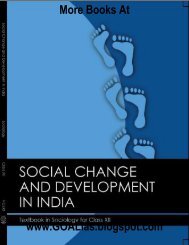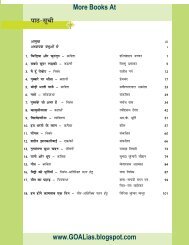t.com www.GOALias.blogspot.com www.GOALias.blogspot.com
t.com www.GOALias.blogspot.com www.GOALias.blogspot.com
t.com www.GOALias.blogspot.com www.GOALias.blogspot.com
- No tags were found...
Create successful ePaper yourself
Turn your PDF publications into a flip-book with our unique Google optimized e-Paper software.
<strong>www</strong>.<strong>GOALias</strong>.<strong>blogspot</strong>.<strong>com</strong>78 Politics in India since Independencefurther after the 1971 war. After the war, assembly elections in mostStates took place, bringing large majorities for the Congress party inmany states.India, with its limited resources, had initiated developmentplanning. However, conflicts with neighbours derailed the five-yearplans. The scarce resources were diverted to the defence sector especiallyafter 1962, as India had to embark on a military modernisation drive.The Department of Defence Production was established in November1962 and the Department of Defence Supplies in November 1965.The Third Plan (1961-66) was affected and it was followed by threeAnnual Plans and the Fourth Plan could be initiated only in 1969.India’s defence expenditure increased enormously after the wars.I amconfused! Isn’tit all about atombombs? Why don’twe say so?India’s nuclear policyAnother crucial development of this period was the first nuclearexplosion undertaken by India in May 1974. Nehru had always puthis faith in science and technology for rapidly building a modernIndia. A significant <strong>com</strong>ponent of his industrialisation plans was thenuclear programme initiated in the late 1940s under the guidance ofHomi J. Bhabha. India wanted to generate atomic energy for peacefulpurposes. Nehru was against nuclear weapons. So he pleaded withthe superpowers for <strong>com</strong>prehensive nuclear disarmament. However,the nuclear arsenal kept rising. When Communist China conductednuclear tests in October 1964, the five nuclear weapon powers, theimpose the Nuclear Non-proliferation Treaty (NPT) of 1968 on the restof the world. India always considered the NPT as discriminatory andhad refused to sign it. When India conducted its first nuclear test, itwas termed as peaceful explosion. India argued that it was <strong>com</strong>mittedto the policy of using nuclear power only for peaceful purposes.The period when the nuclear test was conducted was a difficultperiod in domestic politics. Following the Arab-Israel War of 1973, theentire world was affected by the Oil Shock due to the massive hike inthe oil prices by the Arab nations. It led to economic turmoil in Indiaresulting in high inflation. As you will read in Chapter Six, manyagitations were going on in the country around this time, including anationwide railway strike.Although there are minor differences among political parties abouthow to conduct external relations, Indian politics is generally markedby a broad agreement among the parties on national integration,protection of international boundaries, and on questions of nationalinterest. Therefore, we find that in the course of the decade of1962-1972, when India faced three wars, or even later, when differentparties came to power from time to time, foreign policy has playedonly a limited role in party politics.
















